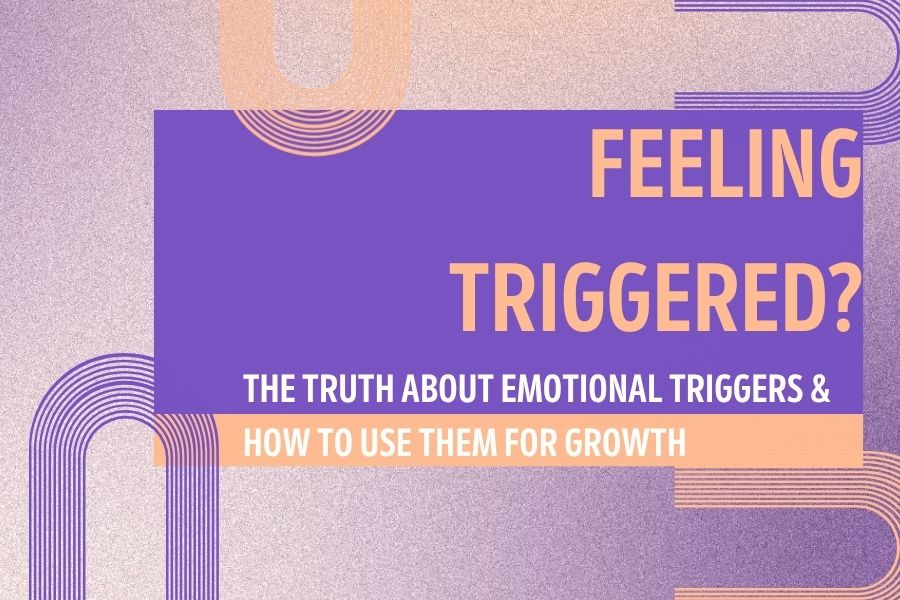
Feeling Triggered? The Truth About Emotional Triggers and How to Use Them for Growth
Share
Ever felt your heart race, your chest tighten, or your mood shift in an instant and wondered, Why am I reacting like this? Those sudden, intense emotional reactions aren’t random. They’re your triggers speaking. Triggers are like hidden signposts, pointing straight to unresolved pain, unmet needs, or old wounds buried deep within.
What if, instead of fearing or avoiding them, you could learn to listen? Understanding your triggers can transform moments of overwhelm into powerful opportunities for healing, self-awareness, and emotional empowerment.
What Are Triggers?
Triggers are emotional responses that arise when something in the present taps into unresolved pain, trauma, or unmet needs from your past. They are often intense and automatic, like a knee-jerk reaction. Imagine hearing criticism at work and instantly feeling like a failure, or sensing tension in a relationship and suddenly feeling abandoned or unsafe. These responses are not random. They are linked to deep, sometimes hidden wounds.
Common Triggers Many People Experience
To make this more relatable, here are some of the most common triggers people face in daily life:
-
Feeling Rejected or Abandoned: This might show up when someone doesn’t respond to a text, cancels plans, or seems emotionally distant. It can trigger feelings of worthlessness or loneliness linked to early childhood neglect or abandonment.
-
Criticism or Judgment: Even gentle feedback can feel like a personal attack if it taps into insecurities or past experiences of harsh criticism from parents or authority figures.
-
Conflict and Anger: Arguments or raised voices can trigger fear, defensiveness, or flashbacks to traumatic family dynamics or abusive relationships.
-
Feeling Controlled or Micromanaged: Being told what to do or feeling trapped can activate a trigger related to loss of autonomy or past experiences of control or oppression.
-
Feeling Invisible or Unseen: When your thoughts, feelings, or needs are ignored, it can awaken wounds connected to feeling unseen or unimportant in childhood or past relationships.
-
Physical Touch or Certain Sounds: Sometimes a specific touch or sound (like a loud noise or a tone of voice) can bring back traumatic memories or overwhelm the nervous system.
Where Do Triggers Come From?
Understanding the origins of triggers helps us approach them with compassion rather than judgment:
-
Past Trauma: Many triggers originate in unprocessed trauma. Whether from childhood, relationships, accidents, or significant losses. Our nervous system holds these memories and reacts when something feels familiar.
-
Unmet Emotional Needs: Triggers often highlight needs for safety, love, validation, or belonging that were unmet. When these needs aren’t fulfilled, small things can feel overwhelming.
-
Limiting Beliefs: Over time, experiences shape beliefs like “I am not enough,” “I am unsafe,” or “I must please others to be loved.” These beliefs amplify trigger responses.
Using Triggers as Guides on Your Healing Journey
Rather than fearing or avoiding triggers, learning to work with them can accelerate healing:
-
Build Self-Awareness: Notice when you’re triggered and journal or reflect on what happened just before. What emotions arise? What memories or beliefs come up?
-
Create Safety: When triggered, remind yourself you are safe now. Use grounding techniques like deep breathing, feeling your feet on the floor, or focusing on your surroundings.
-
Explore the Roots: Gently explore what past experiences might connect to the trigger. This can be done with trusted friends, journaling, or a therapist.
-
Challenge Limiting Beliefs: Replace old stories with compassionate truths. For example, instead of “I am unlovable,” try “I am worthy of love just as I am.”
Practical Ways to Overcome and Manage Triggers
-
Mindfulness Practices: Regular mindfulness meditation helps create space between trigger and reaction, allowing calmer responses.
-
Emotional Regulation Tools: Techniques such as naming your emotions, positive self-talk, and engaging in activities that soothe (like walking, art, or music) help you regain control.
-
Set Healthy Boundaries: Learn to say no and protect your energy to avoid unnecessary triggers.
-
Seek Support: Professional help is invaluable, especially for deep or frequent triggers. Therapists can guide you through trauma processing and teach coping skills.
Reflective Questions to Explore Your Triggers
-
What are the most common situations or people that trigger me, and how do I usually respond?
-
What past experiences or unmet needs might be connected to these triggers?
-
Which beliefs about myself are challenged or reinforced by my triggers?
-
How can I create more safety and compassion for myself when I feel triggered?
-
What small, consistent steps can I take to build resilience and emotional balance?
Triggers are not signs of weakness, they are powerful messengers guiding you to deeper healing and self-understanding. By becoming curious rather than fearful of your triggers, you reclaim control over your emotional world and open the door to empowerment and peace. Remember, healing is a journey, and every step forward, even when triggered, is progress toward a more balanced, joyful you.
Support Your Healing Journey
Using tools like chakra healing journals, self-affirmation candles, and energy healing candles can help you create intentional moments of calm and reflection. These supports nurture your inner strength, help release negative energy, and guide you through the process of navigating triggers with grace and confidence.
